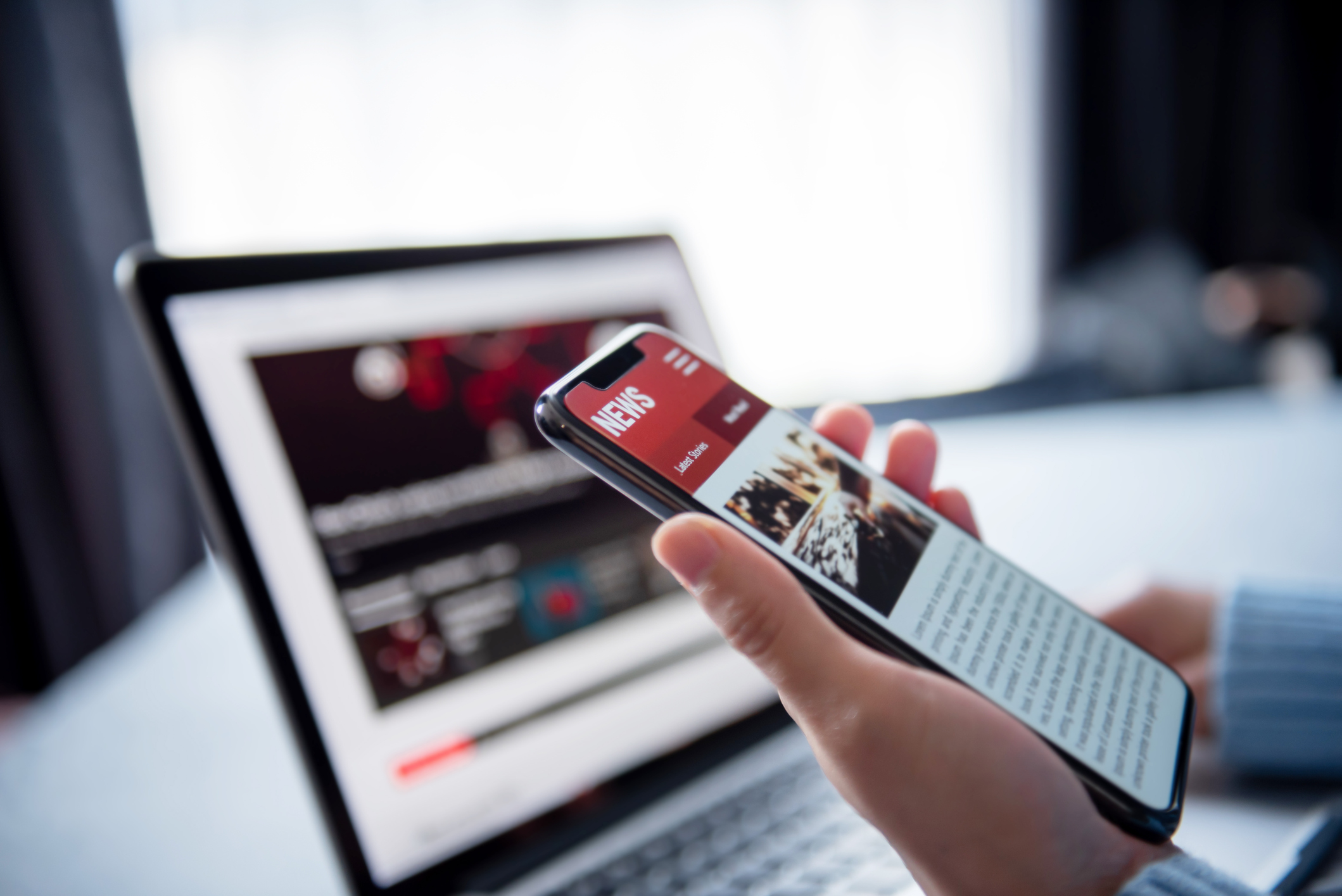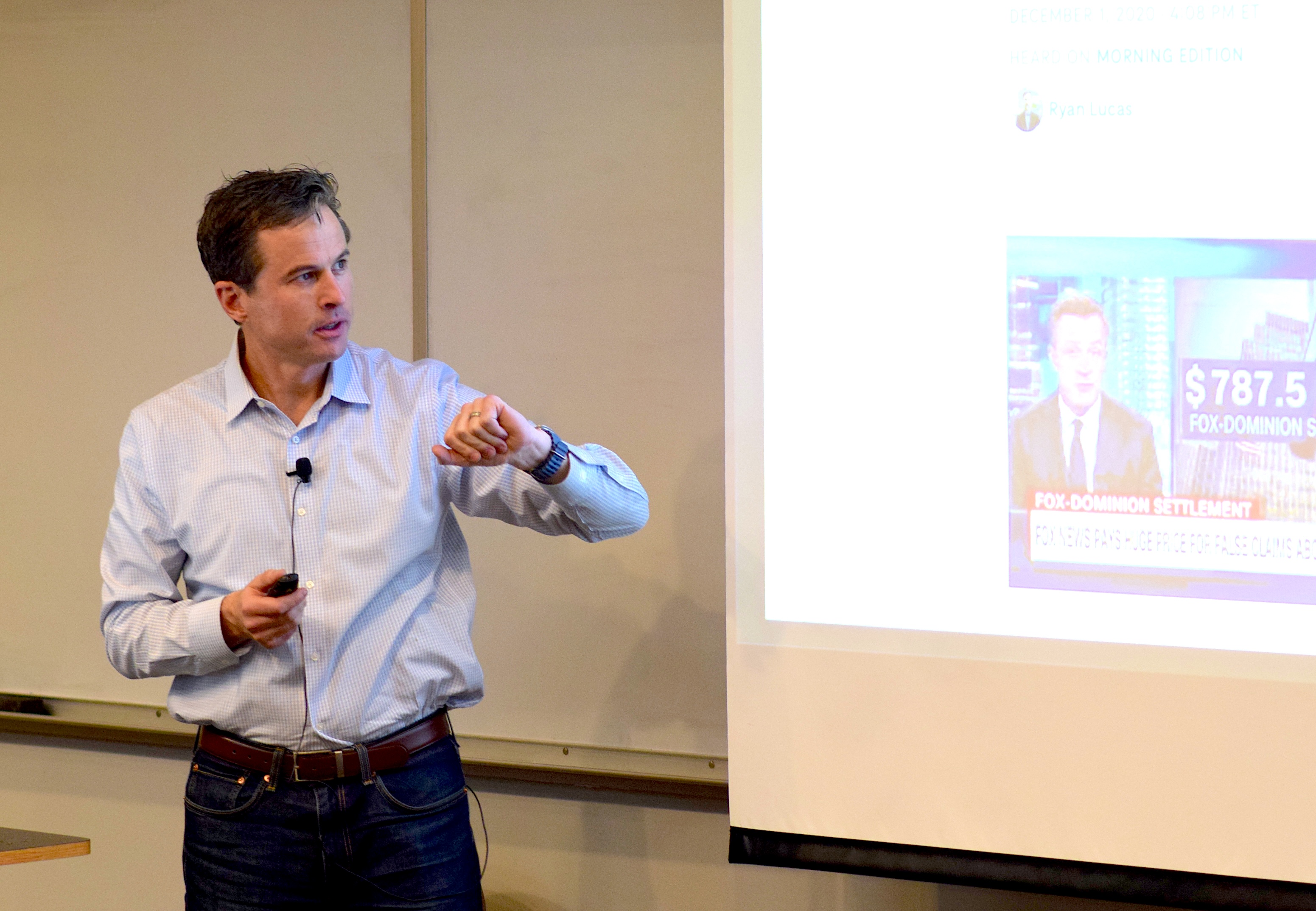Can We Fix 2020 Election Misinformation?
IPR Visiting Scholar Brendan Nyhan explains that fact-checking can change minds—but only if people see it
Get all our news
We had an unprecedented attack on the legitimacy of the American election process in 2020. The evidence was just so overwhelming that those claims had no merit; they had no legal basis.”
Brendan Nyhan
Dartmouth political scientist and IPR visiting scholar

It has been five years since the 2020 presidential election, yet President Donald Trump continues to claim that the race was rigged, calling it the “biggest scandal in American history” and urging investigations. Despite extensive fact-checking by journalists and court rulings confirming no evidence of wrongdoing, millions of Americans still doubt the legitimacy of former President Joe Biden’s election win.
“We had an unprecedented attack on the legitimacy of the American election process in 2020,” Dartmouth political scientist and IPR visiting scholar Brendan Nyhan told a packed room of more than 70 Northwestern faculty, students, and staff on October 6. “The evidence was just so overwhelming that those claims had no merit; they had no legal basis.”
Nyhan is monitoring the health of U.S. democracy through Bright Line Watch—a nonpartisan initiative that he co-directs—that tracks stress on the system: Only about 38% of Republicans now say Biden was the rightful winner, according to their surveys.
His research on misinformation and democratic resilience is especially relevant as the nation looks toward the 2028 presidential race and beyond, when questions about election integrity may once again take center stage.
Nyhan’s talk took place during a weeklong visit to Northwestern as part of IPR’s Visiting Scholars Program. It brings leading researchers to campus to share insights and collaborate on pressing policy challenges.
Laurel Harbridge-Yong, IPR political scientist and associate director, said Nyhan’s work speaks directly to one of the most urgent challenges facing American democracy: misinformation that erodes trust in elections. Through his work on misinformation and fact-checking, she said, Nyhan has become a leading voice in understanding how falsehoods shape public beliefs across domains—from election integrity to vaccine confidence.
“Through his work at Bright Line Watch, he is helping bring the insights of political science experts to the media and the public, who often struggle to separate typical partisan politics from democratic backsliding,” Harbridge-Yong said. “This represents important engagement and impact, making Nyhan an excellent fit with IPR's goal of policy impact.”
Why Do False Beliefs Persist?
Why do so many Americans continue to believe the 2020 election was stolen despite clear and abundant evidence to the contrary—and can those beliefs be changed?
Nyhan and his collaborators are working to answer such questions. Their latest research suggests the issue lies not in tightly sealed partisan echo chambers, but in what many Americans fail to see altogether.

Brendan Nyhan discusses "sticky" misperceptions of the 2020
election on Oct. 6.
To understand why these misperceptions are so “sticky,” Nyhan and his collaborators first tested if these beliefs could be corrected.
In a survey experiment drawn from three nationally representative YouGov surveys conducted between August 2020 and January 2023 with about 2,000 to 5,000 participants in each, participants read an Associated Press (AP) article debunking five specific fraud claims Trump amplified about the election being stolen—fraudulent vote counting, rigged Dominion voting machines, votes cast by dead voters, and barring GOP observers from watching ballot processing.
The fact-checking experiment took place in January 2021, and participants were categorized based on how they described their alignment with Trump or the Republican Party, their 2020 or 2016 vote choice, and their partisan identification as Democrats, Independents, or Republicans. A comparison group read unrelated content.
Afterward, they answered true and false statements. Those who read AP’s correction were more likely to believe accurate information and less likely to accept falsehoods, showing a clear improvement in their ability to tell fact from fiction.
The takeaway: Fact-checking works—when people actually see it.
“There’s nothing special about voter fraud that makes it impossible to change people’s beliefs,” Nyhan said.
What does matter, however, is who sees that information in the first place.
The AP was one of several outlets that fact-checked Trump’s claims of election fraud. So the facts are out there—but are they reaching the right people?
Using anonymized web-browsing data from YouGov Pulse, Nyhan’s team examined what 1,596 people actually read in online news during and after the 2020 election. They also reviewed data from 1,518 adults collected between 2022 and 2023. The dataset captured laptop, desktop, and some mobile web browsing, but did not track exposure to headlines, social media posts, or other forms of content outside full news articles.
They scraped hundreds of thousands of URLs from the internet and used large language models (LLMs) to classify whether news articles mentioned voter fraud, questioned its prevalence, or thoroughly debunked claims.
The results revealed that most people surveyed encountered little news coverage about election fraud at all—and Trump supporters saw even less of the kind that challenged fraud narratives.
“It’s not that they’re in an echo chamber of pro-fraud misinformation,” Nyhan said. “They seem to be avoiding—or simply not being exposed to—the kinds of information that would challenge their preconceptions.”
This pattern, which Nyhan calls “differential inattention,” suggests that false beliefs persist less because people reject the truth and more because they never encounter it in the first place.
Among those who did see news articles about voter fraud, a large proportion of what they encountered offered little pushback. More than a quarter of the articles participants viewed included no questioning at all, and another 37% offered only minimal, passing references noting that Trump's claims were disputed. Articles that extensively debunked fraud allegations were rare, making up just over 8% of what participants saw.
When looking more broadly at any fraud-challenging reporting—including both extensive and moderate questioning—Biden supporters accounted for 77% of all exposure to that content. Only about one third of Trump voters in the sample ever encountered any news articles that seriously challenged fraud narratives.
“What our evidence shows is even on something that's super salient, that was so visible in so many ways, people can still, for whatever reason, not come into contact with it at the frequency you would hope,” Nyhan said.
What Can Be Done?
Fact-checking can change minds, but only if people see it. That means the challenge isn’t just crafting better messages. It’s figuring out how to reach the right audiences.
Nyhan suggested that trusted, local messengers could be critical in combating misinformation. Local sources are often less politicized and more trusted, he emphasized, in contrast to national news that dominates most people's information diets. He also highlighted the importance of respected voices—particularly local leaders and bipartisan figures—in affirming the legitimacy of elections.
The challenge, as Nyhan noted, is that national political discourse has made it increasingly difficult for such trusted voices to break through. He pointed out that when Republican officials initially affirmed the 2020 election's legitimacy, it had a potential impact, but those voices quickly diminished.
As Americans prepare for another presidential race in 2028, Nyhan warned that this isn’t just an academic puzzle, but a threat to democratic stability. Persistent doubts about the 2020 election create a dangerous precedent, and they can resurface whenever a preferred candidate loses.
“The stakes could not be higher,” he said.
Brendan Nyhan is the James O. Freedman Presidential Professor and professor of government at Dartmouth College. Laurel Harbridge-Yong is a professor of political science and IPR associate director and fellow.
About IPR’s Visiting Scholars Program
The Visiting Scholars Program brings exceptional researchers to Northwestern who excel in science outreach, fostering collaboration and intellectual exchange with IPR faculty and students. For more information about the program and Nyhan, visit our program webpage.
Photo credit: iStock
Published: November 18, 2025.


